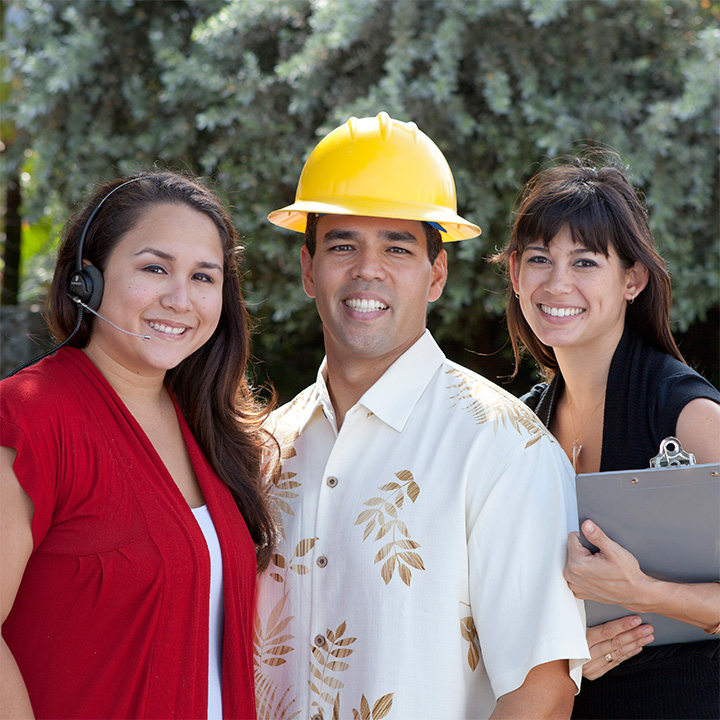Customer Service
- Manage My Account
- Contact Us Form
- Oahu Directory
- Maui County Directory
- Hawaii Island Directory
- Call Centers & Payment Locations
- 2023 Holiday Schedule
- Frequently Asked Questions

Frequently Asked Questions
Hawaiian Electric recommends customers with rooftop solar and/or battery systems check their systems’ main control panel to make sure it is functioning properly once the advanced meter is installed as it may need to be reset. If it’s not working properly, please contact your solar contractor for guidance on how to reset your system.
No, the advanced meter does not have the ability to turn off your water heater without the necessary hardware. While advanced meters will enable Hawaiian Electric to offer customer demand response programs in the future, such programs will require customer or homeowner approval and voluntary participation prior to installation of the required hardware.
Yes, you may request a removal of the advanced meter, which will be replaced by an in-stock, non-communicating digital meter.
No, the advanced meter doesn’t track the activities in a home or the use of appliances or equipment, only the amount of electricity being consumed (and when).
Our AMI or advanced metering infrastructure network utilizes a 902-928 MHz RF frequency range and does not rely on cellular communications, but rather is a secure mesh network.
Each phone carrier – such as AT&T, T-Mobile, Verizon, etc. – uses different frequencies that range from 600 MHz up to 39 GHz for the new high-capacity, ultrafast mmWave (Millimeter Wave) band. The most common frequencies used by the carriers are 600 MHz to 2200 MHz. Wi-Fi also has multiple frequencies, but the most two most common Wi-Fi bands are the unlicensed spectrum in the 2.4 GHz and 5 GHz range. Ham or amateur radio bands also differ widely in frequency depending on the time of day and type (long or short range) of communications, but generally start at 135 kHz (kilohertz) with the allocated spectrum ending at 1240 MHz.
Energy conservation and efficiency are the best and cheapest way to save energy, reduce your electricity bills, and protect the environment. Take a look at your electricity use, then consider and apply measures to be more efficient while preserving comfort and convenience. By first reducing your energy use you may be able to reduce the size of a rooftop solar system and lower your up-front costs.
Efficiency options may include switching to CFLs or LEDs for lighting, installing a solar water heater, and replacing older, inefficient appliances with Energy Star® models. Conservation measures may include turning down the thermostat on electric water heaters, fixing leaking faucets, and discarding an older, second refrigerator or under-used freezer.
To find out more visit www.hawaiienergy.com or www.energystar.gov
- Determine how much electricity you use at what time of day. Will your needs change, like due to getting an electric vehicle or having more people in your home? Research your solar options; will you own, lease or join community solar? A good place to start is:
- Talk to family, neighbors and friends about their experiences and recommendations with adding rooftop solar.
- Consider which utility program works for you and look at your payment options. Visit www.hawaiianelectric.com/products-and-services/customer-renewable-programs/private-rooftop-solar.
- Discuss with prospective contractors how to "right-size"; your rooftop system. If it is too large you are wasting money; if too small you will not get enough power for your home and remain more dependent on your utility.
- Pick a contractor and sign a contract. Your contractor will submit necessary applications to your utility and county permitting department, including using the Hawaiian Electric's online CIT tool to track your application and project status at www.hawaiianelectric.com/CITonline.
- Installation may include roofing and/or service upgrades as well as construction engineering/management, permitting, rooftop work and inspection.
- Your utility will install a new meter and may inspect the completed system.
Information on contractors specializing in distributed energy systems is available from various sources, including:
- Yellow pages under "solar" and "electric contractors" or on the web by searching for "solar contractors Hawaii."
- Newspaper ads
- Friends, relatives, and neighbors who have installed solar systems
- North American Board of Certified Energy Practitioners (NABCEP), www.nabcep.org
- State of Hawaii Professional and Vocational Licensing (PVL) search -This search is designed to help the public obtain basic information about businesses and individuals that hold professional and vocational licenses issued by the State of Hawaii, http://pvl.ehawaii.gov/pvlsearch/app
Consult your tax professional. For background information:
- Database of State Incentives for Renewables & Efficiency (DSIRESOLARTM) www.dsireusa.org.
- Hawaii Department of Taxation, Taxpayer Services Branch
Web Site: tax.hawaii.gov/; E-Mail: Taxpayer.Services@hawaii.gov; Phone: (808) 587-4242 - Your contractor may have incentives or financing opportunities.


